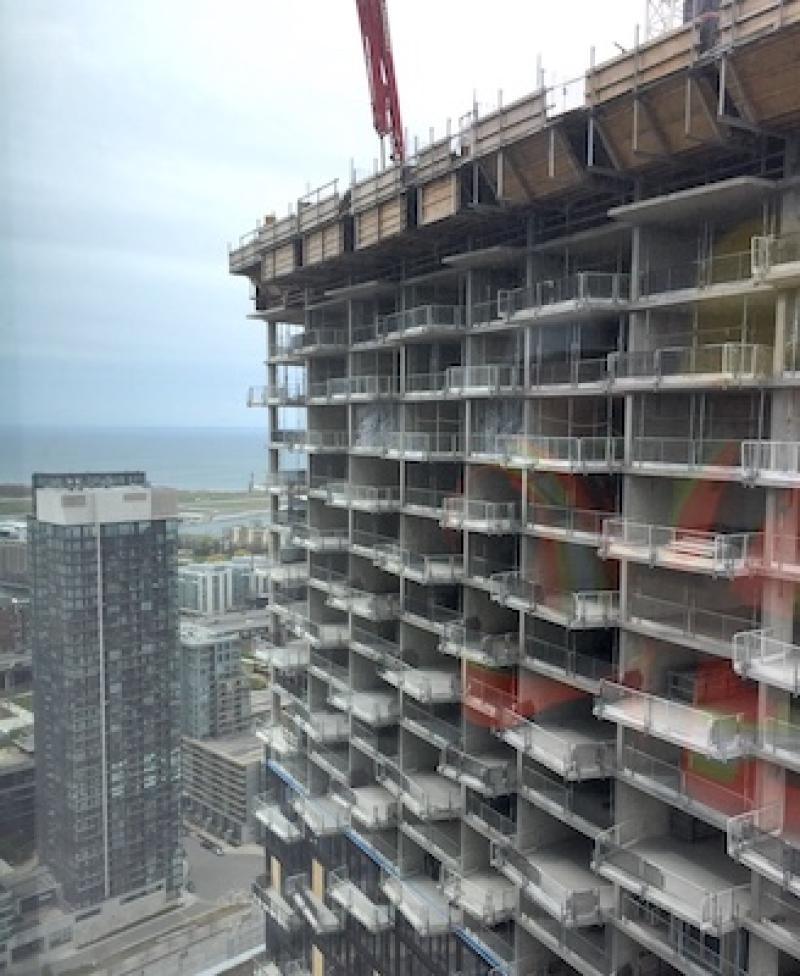
Construction costs have climbed quickly in recent years and where they go from here could have a major impact on development and the real estate industry.
Urban Land Institute Toronto presented a Jan. 30 webinar that examined the current situation and where costs could go in the future.
ULI Toronto executive director Richard Joy hosted the event while DiamondCorp senior vice-president of development Renée Gomes moderated a four-person discussion following an overview from Altus Group senior director of cost consulting and project management Marlon Bray.
Bray believes construction costs will stabilize after the recent large escalations, but won’t drop considerably.
Numbers aren’t encouraging to meet targets
The Ontario government’s More Homes Built Faster Act, introduced in 2022, calls for 1.5 million homes to be built in the province over the next 10 years.
Bray doesn’t believe that’s achievable because developers’ costs are too steep, it takes too long for new housing to be approved and built, and higher interest rates and high prices are discouraging or preventing people from buying.
Thirty-three per cent of developers were pausing new projects in August and that number rose to 73 per cent by November, according to Altus Group.
There were 120,910 condominium and purpose-built rental units under construction in the Greater Toronto Area (GTA) in 2022, compared to 100,973 a year earlier. However, there were 26,819 completions in 2021 and just 19,701 last year.
Completion delays continue to plague development in the province, particularly in the GTA, and Altus Group forecasts housing starts in the province slowing by 16 per cent or more.
Going by current construction status, more than 50,000 condo units are expected to be completed this year. Those numbers drop to just over 30,000 in 2024, just over 20,000 in 2025, about 13,000 in 2026 and about 5,000 in 2027.
Panellists offer opinions on construction costs
Gomes opened the discussion by asking the panellists whether construction cost relief is on the way.
“They're just more moderate and predictable, but still way above overall long-term averages,” CentreCourt partner and senior vice-president Bader Elkhatib said of the costs.
Elkhatib added that costs can differ from site to site and month to month.
“We aren't seeing any pressing relief, either on infrastructure or on the finishing trades that are out in the marketplace right now,” said Fieldgate Developments VP of land development Mike McLean.
“I'm still seeing the material escalations coming in . . . more so on the high-rise side than the low-rise,” said Lee Glavaz, senior project manager for 59 Project Management, which provides project and construction management services.
“Low-rise has been stable and actually coming under budget, but it's been a lot of effort to get that on the low-rise side.”
Glavaz said costs in Toronto were also impacted last year by new labour agreements with unions that raised wages for tradespeople. She didn’t experience those issues with projects in Hamilton.
“We are seeing a bit of a softening in their pricing, but I would say it's not a huge decline,” said Graywood Developments senior VP of construction Alan Christensen. “The trick for us is trying to find a trade that is looking for work.
"Whereas before there weren't any, they are now starting to surface and we're able to make our budgets based on working deals with those trades.”
Environmental and legislative factors
The Toronto Green Standard, used to make buildings more energy efficient and resilient, will be raised from levels implemented last year to higher standards in 2026.
“As an industry, we haven't got a handle on exactly what that's going to cost,” said Christensen. “We’ve got to try and get our consultants ahead of it and the trades ahead of it so that we can start putting some real numbers on it.”
Gomes mentioned the potential impact in Ontario of Bill 109, which made changes to the Planning Act and came into effect on Jan. 1.
“The regulatory changes effectively mean that if a planning application is not processed within the statutory timeline under the Planning Act, then municipalities have to refund 50 per cent or upwards of the fees associated with that application,” she said.
The panellists were mixed about how effective this and other changes will be, but McLean said improvements to the approvals process definitely need to be made.
Other factors to consider
McLean added that major infrastructure projects are pulling labour and tradespeople from residential construction, which will likely add to more delays.
He also has concerns that as the cost of housing continues to rise in Toronto, some tradespeople will be priced out of the market and leave for less expensive cities.
McLean cited reducing high-end interior finishes and maximizing space efficiency as two ways of holding or reducing costs for builders and consumers.
Elkhatib addressed Bray’s assertion that more condo projects are being paused and said he doesn’t expect less construction activity to bring down construction costs.
He said developers in downtown Toronto have been asked by the city to include office and retail components in some of their buildings, and he believes it may be time to push back since that space has “historically been worth significantly less than the highest and best use, and now it's getting even harder to occupy that space with cap rates and rents the way they're trending.”










